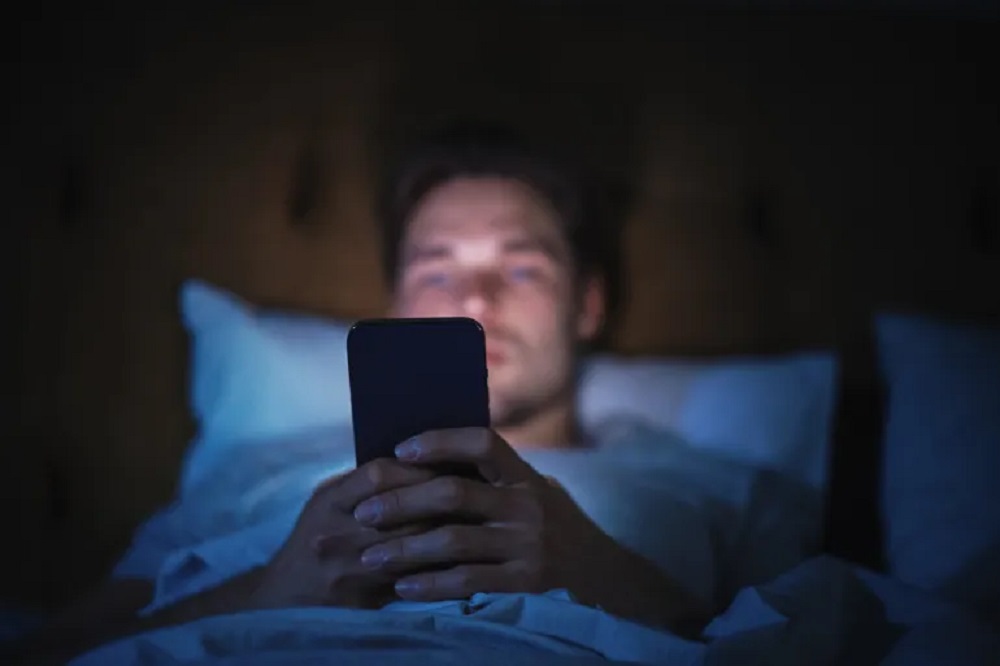Reclaiming Personal Time: Understanding and Overcoming Revenge Bedtime Procrastination
How Delaying Sleep to Regain Freedom Impacts Health and Strategies to Break the Cycle.

Watan-After a long day filled with tasks and exhausting work hours, some individuals return home seeking rest, only to find themselves postponing sleep without a clear reason. The nighttime hours become precious as they grapple between the pleasure of entertainment and succumbing to sleep. While they view this solitary hour as their personal time, this behavior is scientifically known as “revenge bedtime procrastination.”
“Revenge bedtime procrastination” refers to delaying sleep as a form of compensation for a day full of stress or lack of leisure time. The term became popular after a Chinese expression emerged, reflecting the frustration of individuals working long hours without time for recreation. They resort to postponing bedtime to engage in activities they couldn’t fit into their daytime schedule—a way to carve out time for entertainment at the expense of sleep.
The term “revenge bedtime procrastination” was first introduced in a 2014 research paper. In China, the word “revenge” was added to describe the phenomenon of people working up to 12-hour days staying up late as the only way to regain control over their personal time.

The term gained further traction after journalist Daphne K. Lee described it in a tweet as something that happens when “people who don’t have much control over their daytime life refuse to sleep early in order to regain some sense of freedom during late night hours.”
Some studies indicate that students and women are more prone to this behavior. Additionally, individuals who tend to procrastinate in their daily lives are more likely to delay sleep.
Due to the COVID-19 pandemic, increased psychological pressure, and working from home, the rate of sleep postponement has risen for many, as work hours have extended, leaving less time for relaxation.
Although delaying sleep may seem tempting, frequent late nights followed by early mornings can lead to acute sleep deprivation, significantly impacting mental, physical, and emotional health.
When Staying Up Becomes a Reward
Researchers have several explanations for why some people prefer staying up late despite knowing the importance of sleep. It may be due to the individual’s nature; some tend to stay up in a world that relies on early rising. Others may delay sleep as a way to relieve stress after a hard day. Some struggle with general procrastination, leading them to postpone important tasks, including sleep.
Signs of Revenge Bedtime Procrastination
Kendra Cherry, a psychosocial rehabilitation specialist and author of “All About Psychology,” states that not everyone who stays up late necessarily suffers from revenge bedtime procrastination. According to researchers, three main characteristics define this behavior:
- Delaying sleep leads to a reduction in total sleep hours during the night.
- The delay is not due to other reasons like illness or environmental factors affecting sleep.
- The individual is aware that delaying sleep may lead to negative consequences, yet chooses to do so.
The impact of this behavior varies from person to person, depending on their circumstances and reasons for delaying sleep. For parents, the time after their children sleep may be the only opportunity to enjoy some personal moments. For those with busy work schedules, lying on the couch and watching series might be the only way to relax without constraints.
Some utilize late-night and early-morning hours to engage in hobbies or activities that require more effort, but in most cases, these activities are not strenuous. Examples include online shopping, browsing social media, reading, or streaming services—easy activities that people enjoy while delaying sleep.
How Does Delaying Sleep Affect Your Health?
Adults need 7-9 hours of sleep daily, while children and teenagers require more. Therefore, lack of sleep can affect your life in various ways, such as:
- Slow thinking
- Weak memory
- Poor concentration
- Making wrong decisions
- Stress and anxiety
In the long term, sleep deprivation may increase the risk of serious health problems, such as heart disease, diabetes, obesity, weakened immune system, hormonal issues, chronic pain, mental disorders like depression and anxiety, and increased risk of early death.

How to Get Enough Sleep
If you’re suffering from revenge bedtime procrastination, here are some tips to help you sleep better:
- Reduce daytime naps: If you need a nap, keep it short (30 minutes or less) and early in the day.
- Create a relaxing nightly routine: Such as brushing your teeth, reading a book, or doing light stretching exercises.
- Avoid heavy meals before bedtime: Eating right before sleep may make you feel uncomfortable.
- Limit caffeine and smoking: These substances can hinder sleep, especially when consumed late.
- Monitor your water intake: Drinking too much water before bed may lead to frequent awakenings to use the bathroom.
- Stick to a regular sleep schedule: Go to bed and wake up at the same time every day, even on weekends.
- Prepare your bedroom for sleep: Keep the temperature between 19-21 degrees Celsius, turn off the lights and keep electronic devices away, and use soothing sounds if necessary.

The most important step is to schedule short periods of enjoyment during the day and not skip them. There’s no rule preventing you from watching a short episode of your favorite series during a work break or engaging in a fun activity during the day. Incorporating moments of entertainment throughout the day can reduce the need to delay sleep as revenge against the daily routine.
If these tips don’t help, the cause might be a health issue that requires consulting a doctor.




